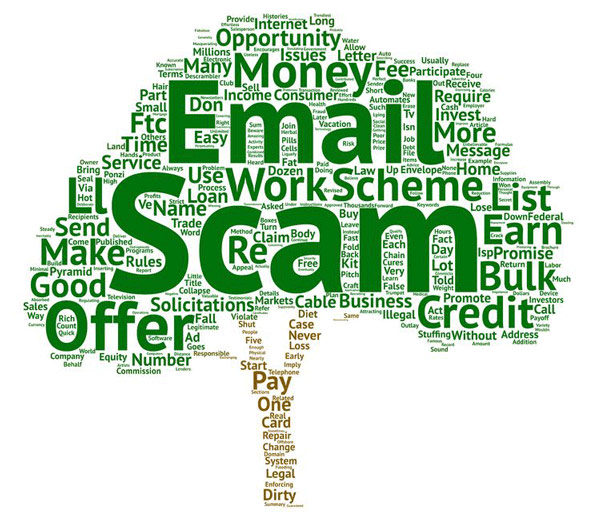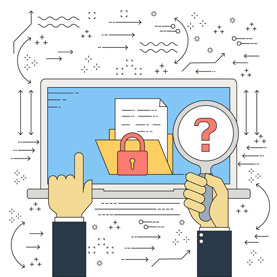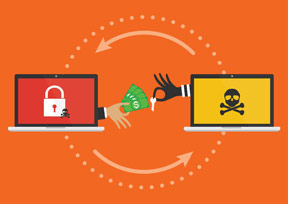Recognizing Email Scams

Email scams have been around as long as email has existed. Many use the same techniques that scammers have been using long before the internet was a common tool. In the internet age, email scams have become more deceptive and common, and even seasoned internet users have fallen victim to these scams.
Unfortunately, there is no program or anti-virus to protect us from these scams. They are social engineering attacks, or scams that rely on tricking users, rather than infecting machines with malicious code or software. The only way to protect yourself from these types of scam is to be aware of them and recognize the signs that an email is a scam. Email programs have improved immensely over the years by adding spam filters and junk folders, but no anti-spam filter is perfect. Below are a few ways to recognize email scams.
Fake Links
Among the most common email scams are phishing scams. These are emails designed to look like a product or service you use (Office 365, paypal, etc.) and they include a link for you to click on and enter login credentials. These emails can be revealed as fake by checking the email address and the URL of the link. Often, the email address will be close to something that the actual company would use (support@m1crosoft.com instead of @microsoft.com for example). Check the email closely to see if the address is spelled correctly.

Another part of the email address to check is the domain (the part of the email address after the @ symbol). Check to see that it matches the company’s website. For example, Wells Fargo would be sending emails from an @wellsfargo.com email not wellsfargobank.com as their website is wellsfargo.com. Next, check the URL by hovering over the link with your mouse cursor. Again, it should match the company’s website. Do not click on the link if it doesn’t match the company’s website. If an email seems fishy to you, don’t trust it. If you aren’t sure, send an email or make a call to the company’s support line to verify the email is real.
Advanced Fee Scams
Another common type of scam is the advanced fee scam. Everyone has heard of the Nigerian prince that will pay you millions of dollars. Their money is locked up and can’t be accessed unless you send them a small fee that they will then use to recover their millions. Usually these emails include some sob story, and try to use your emotions against you. The best thing to remember about these types of scams is that if it seems too good to be true, it probably is. This scam has been around a very long time. The best way to deal with it is to just ignore the email, delete it, and move on.
Employment Search Scams
The employment search scam comes in the form of a job offer, requesting that you fill out a job application. These job applications are designed to get as much personal information as possible in order to steal your identity. Or, they may try to get access to your bank account and steal money that way. If you are being solicited by a company that you didn’t contact first, be very wary of a scam. Do your research on the company. Does the job title match the company’s industry? Do the job postings on their website match the information in the email? If the answers to these questions are no, the chances are good that you’ve discovered a scam.
Disaster Relief/Charity Scams
In times of disaster, where people have died or lost everything, donations sites will be set up to raise funds for those in need. Unfortunately, many people take advantage of this situation by setting up fake charities or phishing sites to get you to donate to them instead of the legitimate organizations. Donation requests through email are nearly always a scam, so ignore them all. If you want to donate to a charity or relief foundation, contact them directly through their website or via phone. NEVER click on a link in an email asking for donations.
people take advantage of this situation by setting up fake charities or phishing sites to get you to donate to them instead of the legitimate organizations. Donation requests through email are nearly always a scam, so ignore them all. If you want to donate to a charity or relief foundation, contact them directly through their website or via phone. NEVER click on a link in an email asking for donations.
The best way to avoid getting scammed is to always be skeptical of anyone asking for your private information. Ask yourself some simple questions like:
Do I know these people?
Did I request this email?
If the answer to these questions is “no”, it is most likely a scam.
Categories
Search
Blog Categories
Related Resources
Archives
- July 2024
- June 2024
- May 2024
- April 2024
- March 2024
- January 2024
- October 2023
- September 2023
- August 2023
- July 2023
- June 2023
- May 2023
- April 2023
- March 2023
- February 2023
- January 2023
- October 2022
- July 2022
- June 2022
- May 2022
- April 2022
- March 2022
- February 2022
- January 2022
- December 2021
- November 2021
- October 2021
- September 2021
- August 2021
- July 2021
- June 2021
- May 2021
- April 2021
- March 2021
- February 2021
- January 2021
- December 2020
- November 2020
- October 2020
- September 2020
- August 2020
- July 2020
- June 2020
- May 2020
- April 2020
- March 2020
- February 2020
- January 2020
- December 2019
- November 2019
- October 2019
- September 2019
- August 2019
- July 2019
- June 2019
- May 2019
- April 2019
- March 2019
- February 2019
- January 2019
- December 2018
- November 2018
- October 2018
- September 2018
- August 2018
- July 2018
- June 2018
- May 2018
- April 2018
- March 2018
- February 2018
- January 2018
- December 2017
- November 2017
- October 2017
- September 2017
- August 2017
- July 2017
- June 2017
- May 2017
- April 2017
- March 2017
- February 2017
- January 2017
- December 2016
- November 2016
- October 2016
- September 2016
- August 2016
- July 2016
- June 2016
- May 2016
- March 2016
- February 2016
- January 2016
- December 2015
- October 2015
- September 2015
- August 2015
- July 2015
- June 2015
- May 2015
- April 2015
- March 2015
- February 2015
- January 2014
- February 2013




